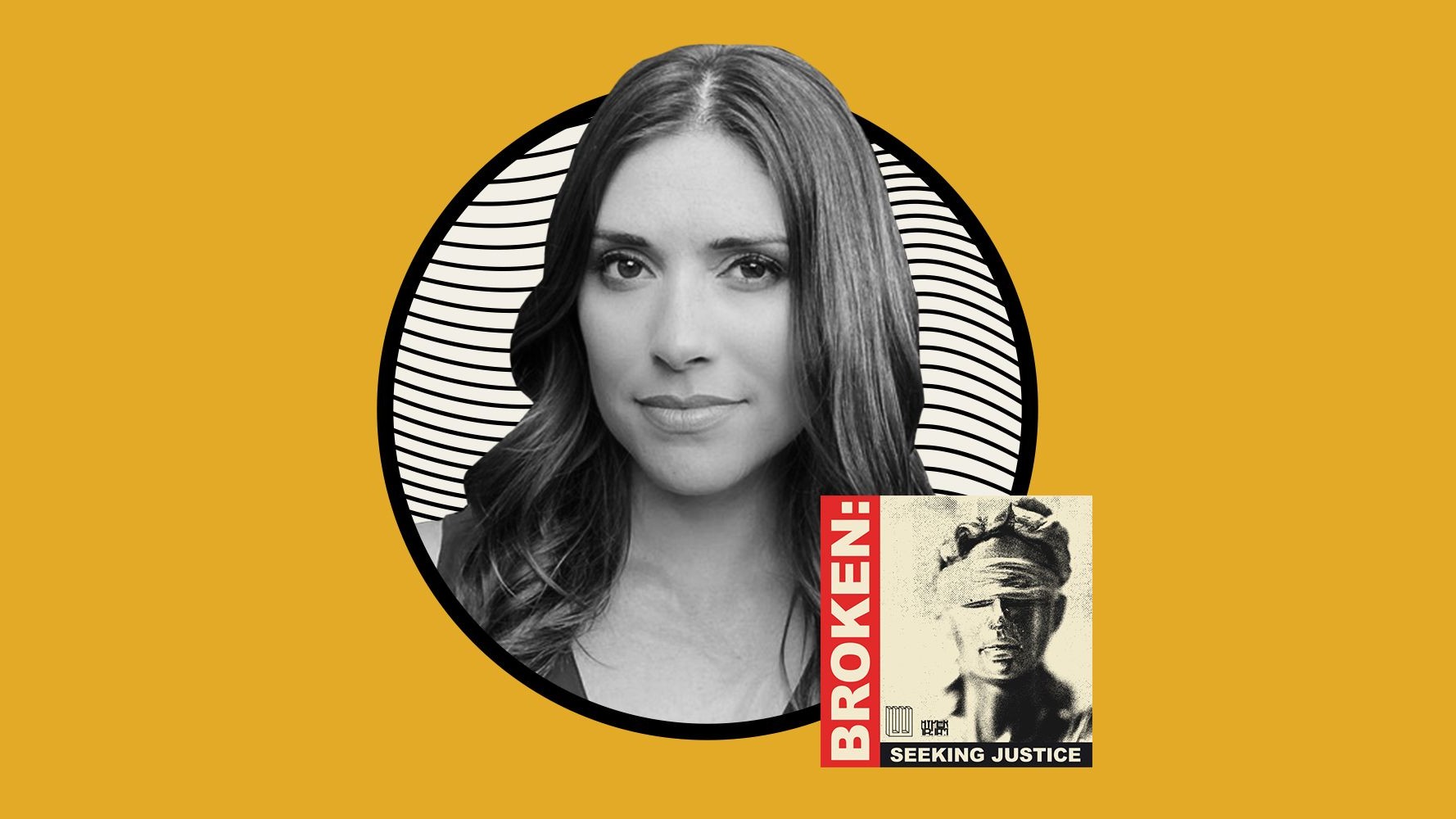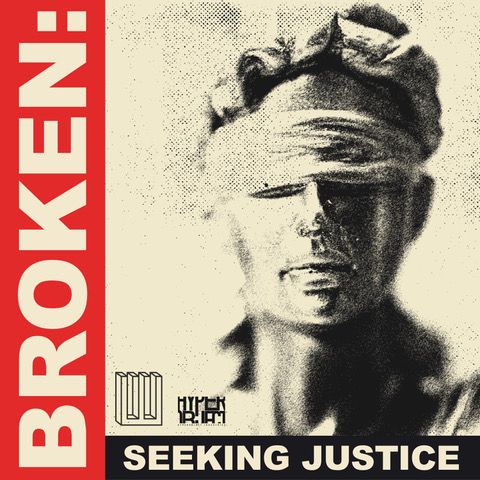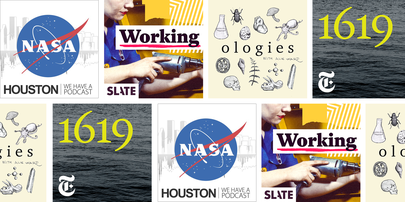Tara Palmeri on Hosting a Podcast That Finally Gives Jeffrey Epstein Survivors Their Due
In Broken: Seeking Justice, Palmeri helps sexual assault survivors reconcile their pasts and tell their stories.

CONTENT WARNING: The below story contains discussion of sexual assault. This content may be triggering for some readers.
In the time since his highly publicized arrest on charges of sex trafficking and subsequent death by suicide in 2019, Jeffrey Epstein's story has been told and retold; shared, discussed and turned into clickbait. The well-connected billionaire and convicted sex offender has, for better or worse, become legend of sorts. His story used as fodder for conspiracy theorists, primetime court procedurals, and endless podcasts.
Enter Tara Palmeri. The investigative journalist and former White House
correspondent hosts Broken: Seeking Justice, the followup season to TKyear's Broken: Jeffrey Epstein. But while other podcasts focused on the man and his horrid crimes, Palmeri approached her job with a fresh perspective: What if, instead, we focused on the system that allowed Epstein, a wealthy white male, to go unchecked for decades?
Better yet, what if we listen to and believe the women?
Here, Palmeri speaks to Marie Claire about why she felt strongly about reframing Epstein's story to focus on survivors like Virginia Roberts Giuffre and Courtney Wild, how the #MeToo movement has helped facilitate conversations around sexual assault, and the hope she has in the justice system's ability to be fixed.
Marie Claire: What drew you to working on a podcast about Jeffrey Epstein's survivors?
Tara Palmeri: I know what it's like to be 16 years old and to feel like your world has fallen apart; to be sexually abused by someone and to feel like you're powerless because that person has more money or resources. [To feel like] you would lose it all; you'd have shame; your family would have to go through so much.
Get exclusive access to fashion and beauty trends, hot-off-the-press celebrity news, and more.
When I was 16, I was raped, and that was how I lost my virginity. It was really, really frightening, and [at the time] I wanted to do something—I played out every scenario in my head of what I could do about it. But I ultimately decided that I was going to do nothing and try to pretend it never happened. I related to the Epstein girls because they were, a lot of them, that [same] age. And they didn't have the sort of resources that Jeffrey Epstein had. He picked young girls who were sexually inexperienced. He manipulated and exploited them, and I sympathize with them.
MC: Did that experience change how you approached reporting and covering the subject matter?
TP: I felt like [previous coverage] was too pornographic in a lot of ways. It was just like porn and political conspiracies. And everyone was getting a piece out of that story, but the women weren't getting their fair due... In a lot of ways, I didn't think they were being treated the same way as a lot of other #MeToo victims. Because they weren't big names. There was just so much fixation on Jeffrey and not on them.
To me, the right way [to report it] was through the eyes of the victims who felt like justice slipped from their fingers. Victims who know that so many people either stood by and let this happen or were involved, and that they're still out there. So many people just want this story swept under rug and that made it even more of a reason for me to do it.
The producers [Adam McKay, Adam Davidson, Laura Mayer] and I took time to talk about, What does Epstein represent in our society? So that when you're listening to this you're not just like, Oh, that was our James Bond; a Catch Me If You Can [character] who got away with everything. What he did was horrific, so let's get back to what he represents and how that impacted these incredibly strong, amazing women. So many of those victims were fighting for 10 years to be heard... I'm happy that people are listening now. I feel for them that they want to keep beating the drum on the Epstein story, as much as people might say, I'm tired of it. I've heard enough of what I wanna hear. No, this story is not over yet.
MC: Was changing the podcast name from Broken: Jeffrey Epstein to Broken: Seeking Justice part of that decision to bring the focus back to the survivors?
TP: We started getting to: Why are we even putting his name in this anymore? Let's stop glorifying this guy, because this is about women seeking justice. You could really honestly insert [any sex offender into the conversation].
The other thing that was so interesting to me about this story was that the victims felt betrayed, sometimes more so by the women who recruited them or the people who stood by and did nothing about it, than by Jeffrey Epstein. It's the story of our time: How do we treat people with wealth and power and privilege in the justice system compared to people who don't have that? Especially, how do we treat men and women differently in the justice system? I always said I want this to be about women taking agency.
MC: A big theme throughout this season is these women wanting to feel seen, believed, and heard, rather than pursuing legal action. Did that surprise you?
TP: When prepping for the podcast I talked to a trauma counselor for guidance on how to interview [the survivors] properly. How to be respectful and to understand what it was that they were going through. She explained this whole phenomenon to me: wanting to connect with someone from their past and be heard and recognized and seen. How that can be really healing. But it can also be really painful if they don't get what they wanted.
How do we treat people with wealth and power and privilege in the justice system compared to people who don't have that?
MC: There's moment in an early episode, when you're speaking to Epstein's former driver and house manager, and you seem frustrated that he wasn't being super forthcoming. But Virginia [Roberts Giuffre] just seemed thrilled he recognized her.
TP: That's all she cared about. I was like, He's a liar, I don't know why we're here. And she's like, But he acknowledged me! Because think about how many famous men have said, I do not know who Virginia Roberts is. I've never seen that woman in my life.
MC: There's a lot of gaslighting.
TP: So many of these women just want someone to hear their story. They want to talk to people from their past who will validate their pain and will say, You know what? I'm sorry. Sometimes just being validated or acknowledged is really what they're looking for more than anything else. More than winning some legal fight.
MC: Did working on this podcast and spending time with these women help you process, in any way, the trauma from your own assault?
TP: After I saw [Epstein survivor] Courtney Wild, I did something I wanted to do for a really long time. I called this woman who I knew as a teenager. There were rumors at the time: This person went crazy after going out with this guy and blah blah. I thought, I'm just gonna call this person who I've been thinking about for 16 years. I said to her, 'This happened to me in high school. Do you know if this happened to anyone else?' She said, 'Yeah. He did the exact same thing to me and six other girls. I'm so sorry I never said anything about it.' And I said, 'Why are you sorry? This isn't your fault.' She goes, 'There wasn't a #MeToo movement then. We just didn't talk about it.' And she's right. There was so much shame that we all had to bear and to carry ourselves, as women.
I want to live in a world where it's safe for women to talk about what happens to them. And, if [I'm], as a journalist, asking these women to tell some of their deepest, darkest stories, and I can't even talk about it myself...? It was a moment for me where I was, like, I need to kinda solve my own case. I need to have a little clarity. And maybe one day, I'll take another step.

MC: Another main focus of this season is "enablers:" people who witness the crime and allow it to continue. It was shocking to me how little attention enablers get when speaking about sexual assault. Did you feel similarly?
TP: They should really be a bigger part of the conversation. Because Epstein was so wealthy and because he had so many people in his orbit who he could pay to do things for him, they all stayed quiet for access to him and his wealth. That's sort of the most shocking thing about it. It's kind of a symbol: If you have enough power and money, then you can do whatever you want. And you can pay people to do things they probably are ashamed of, like standing by when they see a stream of young girls going into the house.
If you have three girls a day, you need a driver driving them around and you have a chef feeding them. You have adult women who are literally booking them. It was an operation.
And yes, enablers are a weird thing, right? Because so many are gonna say, 'I didn't see anything.' But, at some point it's like, where does your responsibility lie? Being in the enabler position is really hard, because you could give up your livelihood. You could give up your reputation. You have a lot to lose. And you're doing it for somebody else. You're doing it to protect someone else. And that's really a brave thing to do. But it is the thing to do if we live in a moral society.
MC: In one of the first few episodes Virginia says, 'Justice isn't just about someone going to jail. It's about changing the system.' After working on this podcast are you hopeful about the system's ability to be fixed?
TP: I do think things have already gotten so much better. Even in the national discussion, how we talk about survivors of sexual abuse and how they're being heard and seen now. How we're working to make sure that shame is taken away from them. I think the #MeToo movement has really done that—people are prepared and ready to listen to victims who are women. The more we keep these conversations going, the more that people know they're not alone and that the feelings that they have, which are confusing, that they're not the only one. That's certainly what I've learned: You're not the only person to experience [sexual assault]. If we can get past those stigmas and we can have real, honest conversations about how these crimes affect people for the rest of their lives, I think that's one step forward.
New episodes of Broken: Seeking Justice drop weekly on Wednesdays.
This interview has been edited and condensed for clarity.
Related Stories


Neha Prakash is Marie Claire's Entertainment Director, where she edits, writes, and ideates culture and current event features with a focus on elevating diverse voices and stories in film and television. She steers and books the brand's print and digital covers as well as oversees the talent and production on MC's video franchises like "How Well Do You Know Your Co-Star?" and flagship events, including the Power Play summit. Since joining the team in early 2020, she's produced entertainment packages about buzzy television shows and films, helped oversee culture SEO content, commissioned op-eds from notable writers, and penned widely-shared celebrity profiles and interviews. She also assists with social coverage around major red carpet events, having conducted celebrity interviews at the Met Gala, Oscars, and Golden Globes. Prior to Marie Claire, she held editor roles at Brides, Glamour, Mashable, and Condé Nast, where she launched the Social News Desk. Her pop culture, breaking news, and fashion coverage has appeared on Vanity Fair, GQ, Allure, Teen Vogue, and Architectural Digest. She earned a masters degree from the Columbia School of Journalism in 2012 and a Bachelor of Arts degree from The Pennsylvania State University in 2010. She lives in Manhattan with her husband and dog, Ghost; she loves matcha lattes, Bollywood movies, and has many hot takes about TV reboots. Follow her on Instagram @nehapk.